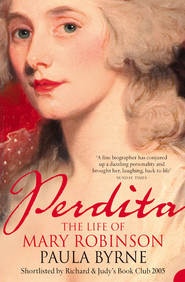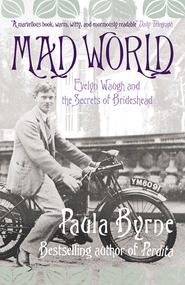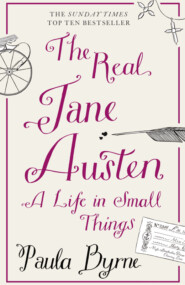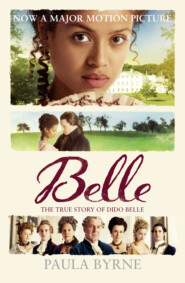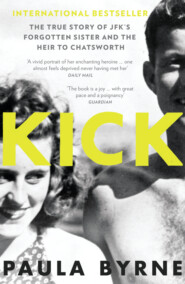По всем вопросам обращайтесь на: info@litportal.ru
(©) 2003-2024.
✖
The Genius of Jane Austen: Her Love of Theatre and Why She Is a Hit in Hollywood
Настройки чтения
Размер шрифта
Высота строк
Поля
Daniel Terry (1780–1829) had made his debut at Covent Garden on 8 September, just a few days before Jane Austen saw him.31 (#litres_trial_promo) Sir Walter Scott was a great friend and admirer of Terry (who adapted several of the Waverley novels for the stage),32 (#litres_trial_promo) and claimed that he was an excellent actor who could act everything except lovers, fine gentlemen and operatic heroes. Scott observed that ‘his old men in comedy particularly are the finest I ever saw’.33 (#litres_trial_promo) Henry Austen showed a little more tolerance than his sister in allowing Mr Terry teething troubles in the role of one of the most celebrated old men of eighteenth-century comedy.
Henry Austen’s faith in Terry’s capacity to grow into a beloved role reflects the performer-oriented tendency of the age. But Jane’s powerful and striking description of Don Juan is a far less typical response. Here a more discerning and discriminating voice prevails. Rather than the performer being the main focus of interest, she is responding to the perverse appeal of the character beneath the actor. The famous blackguard was still obviously on her mind, belying her earlier insistence upon ‘tranquil delight’ and ‘sober-mindedness’.
Jane Austen’s reference to Midas confirms that she had seen this entertainment at an earlier date. Garrick and Colman’s brilliant comedy The Clandestine Marriage had also been known to her for a long time. The title appears as a phrase in one of her early works, Love and Freindship, and, as will be seen, the play was a source for a key scene in Mansfield Park.
Austen was disappointed with her latest theatrical ventures, though had she stayed longer in London she might have been disposed to see Elliston in a new play, First Impressions, later that month.34 (#litres_trial_promo) When she wrote to her brother Frank, she complained of the falling standards of the theatres:
Of our three evenings in Town one was spent at the Lyceum & another at Covent Garden; – the Clandestine Marriage was the most respectable of the performances, the rest were Sing-song & trumpery, but did very well for Lizzy & Marianne, who were indeed delighted; but I wanted better acting. – There was no Actor worth naming. – I beleive the Theatres are thought at a low ebb at present. (Letters, p. 230)
Austen’s heart-felt wish for ‘better acting’, or, in Edmund Bertram’s words, ‘real hardened acting’, was soon to be realised.
Drury Lane had indeed reached its lowest ebb for some years when it was rescued by the success of a new actor, Edmund Kean (1787–1833), who made his electrifying debut as Shylock in January 1814. The story of his stage debut has become one of the most enduring tales of the theatre. The reconstructed Drury Lane Theatre, rebuilt after it was destroyed by fire in 1809, was facing financial ruin, greatly exacerbated by the ruinous management of R. B. Sheridan, when a strolling player from the provinces, Edmund Kean, was asked to play Shylock.35 (#litres_trial_promo) Kean, in his innovative black wig, duly appeared before a meagre audience, mesmerising them by his stage entrance. At the end of the famous speech in the third act, the audience roared its applause. ‘How the devil so few of them kicked up such a row’, said Oxberry, ‘was something marvelous.’36 (#litres_trial_promo) Kean’s mesmerising appearance on the stage was given the seal of approval when Hazlitt, who after seeing him on the first night, raved: ‘For voice, eye, action, and expression, no actor has come out for many years at all equal to him.’37 (#litres_trial_promo)
The news of Kean’s conquest of the stage reached Jane Austen, and in early March 1814, while she was staying with Henry during the negotiations for the publication of Mansfield Park, she made plans to see the latest acting sensation:
Places are secured at Drury Lane for Saturday, but so great is the rage for seeing Keen [sic] that only a third & fourth row could be got. As it is in a front box however, I hope we shall do pretty well. – Shylock. – A good play for Fanny. She cannot be much affected I think. (Letters, p. 256)
The relatively short part of Shylock is thus considered to be a suitably gentle introduction to Kean’s powerful acting for the young girl. But Austen’s own excitement is barely contained in her description of the theatre party: ‘We hear that Mr Keen [sic] is more admired than ever. The two vacant places of our two rows, are likely to be filled by Mr Tilson & his brother Gen. Chownes.’ Then, almost as if she has betrayed too much pleasure in the absence of her sister, she writes: ‘There are no good places to be got in Drury Lane for the next fortnight, but Henry means to secure some for Saturday fortnight when You are reckoned upon’ (Letters, p. 256).
Another visit to see Kean was intended, and Henry’s acquaintance with the theatre world again emphasised. The party went to Drury Lane on the evening of 5 March, attending the eighth performance of The Merchant of Venice. Austen’s initial response to the latest acting phenomenon was calm and rational: ‘We were quite satisfied with Kean. I cannot imagine better acting, but the part was too short, & excepting him & Miss Smith, & she did not quite answer my expectations, the parts were ill filled & the Play heavy’ (Letters, p. 257). Hazlitt, too, frequently complained that one of the problems of the star system was filling up the smaller parts. In his review of The Merchant of Venice, he was only grudgingly respectful of the minor roles.
Kean was still very much on Austen’s mind, for in the same letter, in the midst of a sentence about Henry Crawford and Mansfield Park, she unexpectedly reverted to the subject of him with greater enthusiasm: ‘I shall like to see Kean again excessively, & to see him with You too; – it appeared to me as if there was no fault in him anywhere; & in his scene with Tubal there was exquisite acting’ (Letters, p. 258).
Jane Austen was conscious of the dramatic demands of Shylock’s scene, which required the actor to scale, alternately, between grief and savage glee. Her singling out of this particular scene was no doubt influenced by the reports of the opening night, where the audience had been powerless to restrain their applause. Kean’s biographer noted the subtle intricacies of the scene in the third act ending with the dialogue between Shylock and Tubal:
Shylock’s anguish at his daughter’s flight, his wrath at the two Christians who had made sport of his suffering, his hatred of Christianity generally, and of Antonio in particular, and his alternations of rage, grief and ecstasy as Tubal enumerated the losses incurred in the search of Jessica – her extravagances, and then the ill-luck that had fallen on Antonio; in all this there was such originality, such terrible force, such assurance of a new and mighty master, that the house burst forth into a very whirlwind of approbation.38 (#litres_trial_promo)
For many critics, the greatest quality of Kean’s as Shylock was his ability to change emotional gear at high speed, to scale the highest points and the lowest. Thus Hazlitt:
In giving effect to the conflict of passions arising out of the contrasts of situation, in varied vehemence of declamation, in keenness of sarcasm, in the rapidity of his transitions from one tone and feeling to another, in propriety and novelty of action, presenting a succession of striking pictures, and giving perpetually fresh shocks of delight and surprise, it would be difficult to single out a competitor.39 (#litres_trial_promo)
Kean’s acting style was hereafter characterised as impulsive, electric and fracturing. ‘To see him act’, Coleridge observed famously in his Table Talk, ‘is like reading Shakespeare by flashes of lightning.’40 (#litres_trial_promo)
In contrast to her reaction to Kean, Jane Austen was disappointed with the performance of her old favourite Elliston. The programme that night included him in an oriental ‘melodramatic spectacle’ called Illusion; or The Trances of Nourjahad. The Austen party left before the end:
We were too much tired to stay for the whole of Illusion (Nourjahad) which has 3 acts; – there is a great deal of finery & dancing in it, but I think little merit. Elliston was Nourjahad, but it is a solemn sort of part, not at all calculated for his powers. There was nothing of the best Elliston about him. I might not have known him, but for his voice. (Letters, pp. 257–58)
Henry Crabb Robinson also saw Elliston as Nourjahad and wrote in his diary that ‘his untragic face can express no strong emotions’. Robinson admired Elliston as a ‘fine bustling comedian’, but thought that he was a ‘wretched Tragedian’.41 (#litres_trial_promo) Austen’s observation that Elliston’s brilliance lay especially in his comic powers was a view shared by his critics and admirers. Charles Lamb thought so too, but was afraid to say so when Elliston recounted how Drury Lane was abusing him. Lamb recorded: ‘He complained of this: “Have you heard … how they treat me? they put me in comedy.” Thought I – “where could they have put you better?” Then, after a pause – “Where I formerly played Romeo, I now play Mercutio.”’42 (#litres_trial_promo)
Austen’s ‘best Elliston’ was altered from his glory days at Bath and his early promise at Drury Lane as a result of physical deterioration brought on by hard drinking. His acting powers had steadily declined. From managing various minor and provincial theatres, he finally became the lessee and manager of Drury Lane from 1819 until 1826, when he retired, bankrupt through addiction to drinking and gambling.
Elliston’s acting talent suffered when he threw his energies into his multifarious business ventures. The London Magazine and Theatrical Inquisitor observed that in later years he had fallen into ‘a coarse buffoonery of manner’ and Leigh Hunt oberved that he had ‘degraded an unequivocal and powerful talent for comedy into coarseness and vulgar confidence’.43 (#litres_trial_promo)
Three days after seeing Kean and Elliston at Drury Lane, Jane Austen went to the rival house Covent Garden to see Charles Coffey’s farce, The Devil to Pay. ‘I expect to be very much amused’, she wrote in anticipation (Letters, p. 260). Dora Jordan played Nell, one of her most famous comic roles. The party were to see Thomas Arne’s opera Artaxerxes with Catherine Stephens (1794–1882), the celebrated British soprano who later became Countess of Essex. She was, however, less excited by the opera than the farce: ‘Excepting Miss Stephens, I dare say Artaxerxes will be very tiresome’ (Letters, p. 260). Catherine Stephens acted Mandane in Artaxerxes, a role in which Hazlitt thought she was superb, claiming that he could hear her sing ‘forever’: ‘There was a new sound in the air, like the voice of Spring; it was as if Music had become young again, and was resolved to try the power of her softest, simplest, sweetest notes.’44 (#litres_trial_promo) Austen’s response was just as she expected: ‘I was very tired of Artaxerxes, highly amused with the Farce, & in an inferior way with the Pantomime that followed’ (Letters, p. 260). However, she was unimpressed with Catherine Stephens and grumbled at the plan for a second excursion to see her the following night: ‘I have had enough for the present’ (Letters, p. 260).
Neverthless, in spite of a cold, she joined the party to see Stephens as Mrs Cornflower in Charles Dibdin’s The Farmer’s Wife, a role created for her musical ability and her talent in low comedy:
Well, we went to the Play again last night … The Farmer’s Wife is a musical thing in 3 acts, & as Edward was steady in not staying for anything more, we were at home before 10 – Fanny and Mr J. P. are delighted with Miss S. & her merit in singing is I dare say very great; that she gave me no pleasure is no reflection upon her, nor I hope upon myself being what Nature made me on that article. All that I am sensible of in Miss S. is, a pleasing person & no skill in acting. We had Mathews, Liston and Emery: of course some amusement. (Letters, p. 261)
Though disappointed with Stephens, she enjoyed the performances of Mathews, Liston and Emery, who were three of the great comedians of the day. Tall and skinny, Charles Mathews was noted for his brilliance as ‘officious valets and humorous old men’.45 (#litres_trial_promo) His long-time friend and fellow-actor, the inimitable John Liston, often appeared alongside him.46 (#litres_trial_promo)
Liston (1776–1846) was the highest paid comedian of his time.47 (#litres_trial_promo) Hazlitt described him as ‘the greatest comic genius who has appeared in our time’.48 (#litres_trial_promo) He was noted for his bumpkin roles and humorous old men. Leigh Hunt observed that his ‘happiest performances are ignorant rustics … he passes from the simplest rustic to the most conceited pretender with undiminished easiness of attainment’.49 (#litres_trial_promo) Liston’s grave and serious face added to the effect of his comedy, Lamb wrote: ‘There is one face of Farley, one of Knight, one (but what a one it is!) of Liston’.50 (#litres_trial_promo) For Hazlitt, Liston had ‘more comic humour oozing out of his features and person than any other actor’.51 (#litres_trial_promo) He was a particularly fine Baron Wildenhaim in Lovers’ Vows.
John Emery (1777–1822) also played in the same line of old gentlemen and rustics, and was compared to Liston: ‘If our two stage-rustics, Emery and Liston, are compared, it will be found that the former is more skilled in the habits and cunning of rusticity, and the latter in its simplicity and ignorance.’ But Hunt later claimed of Emery that, in playing the countrymen, the field was ‘exclusively and entirely his’.52 (#litres_trial_promo) Hazlitt also observed that ‘in his line of rustic characters he is a perfect actor’.53 (#litres_trial_promo)
The Farmer’s Wife was a vehicle for the singing arts of Stephens and the comic talents of Mathews, Liston and Emery. It tells a rather tired tale of an innocent (Emma Cornflower) abducted by a debauched aristocrat (Sir Charles). Mathews plays a village apothecary, Dr Pother. Liston played a cunning London manservant to Sir Charles. This served as a comic contrast to Emery’s ignorant but good-hearted Yorkshireman, servant to Farmer Cornflower.54 (#litres_trial_promo) The play’s comic juxtapositions of high and low characters drew on a convention long associated with the stage: the contrast between town and country, a theme that Austen had been working on in Mansfield Park.
Jane Austen’s blunt assertion that Stephens had ‘no skill in acting’ is refreshing and to the point, in an age distinguished by its over-elaborate encomiums of actors and their roles. Furthermore her remark reveals a strong and discerning voice, one that knows what ‘good hardened acting’ is, and isn’t, and is confident in its own critical judgement without being unduly influenced by the current favourite of the stage. After revealing the details of the previous night’s theatre to Cassandra, she wrote of plans for yet another excursion to Covent Garden to see Kean’s rival, Charles Mayne Young (1777–1856), acting in Richard III: ‘Prepare for a Play the very first evening. I rather think Covent Garden, to see Young in Richard’ (Letters, p. 261).
Young had been the leading tragedian of the London stage before Kean challenged his supremacy in 1814. Young was in the Kemble school of acting, and was noted for his heroic, dignified acting style, though he was often compared unfavourably with his predecessor Kemble: ‘His most striking fault, as a tragic actor, is a perpetual imitation of Mr Kemble.’55 (#litres_trial_promo) He was often criticised for his lack of passion: ‘Mr Young never gives himself up to his feelings, but always relies upon his judgement – he never acts from the heart, but the head.’56 (#litres_trial_promo) Leigh Hunt was lukewarm about his abilities, describing him as an actor of ‘elegant mediocrity’, and Hazlitt was even more disparaging, especially of Young’s Hamlet: ‘he declaims it very well, and rants it very well; but where is the expression of the feeling?’57 (#litres_trial_promo) Since Cassandra was coming to London, and presumably accompanied her sister to see Young’s Richard, there is no letter describing Jane’s reaction to his rendering of the part. But the critical consensus was that the performance was not a success.
The opposition between the Kemble/Young and the Cooke/Kean school of acting was often couched as a conflict between reason and feeling, judgement and passion. It is striking that Austen, who is so often associated with ‘sense’ rather than ‘sensibility’, clearly admired Kean’s acting but seems to have had little enthusiasm for the Kemble school. Though she names most of the major stars of the London stage in her surviving letters, there is not a single mention of John Philip Kemble himself.
Jane Austen did see Young again, this time with the new acting sensation, Eliza O’Neill, who had made her triumphant debut a month earlier as Juliet and was heralded as the only tragedian worthy to take over the mantle of Sarah Siddons. Just as Drury Lane had been saved from the brink of financial ruin by the advent of Kean, so Covent Garden was desperate to bring forward its own star in reply.58 (#litres_trial_promo) Byron refused to see O’Neill out of his loyalty to Kean and Drury Lane, and for fear that he would like her too much: ‘No I’m resolved to be un-“Oneiled”’.59 (#litres_trial_promo) As with Kean’s debut earlier that year, audiences acclaimed O’Neill as a genius from the provinces; it was claimed that some spectators fainted under her spell.60 (#litres_trial_promo)
Jane Austen’s last known visit to the professional theatre took place late in 1814. She was as keen to see Covent Garden’s new star as she had been to see Kean, and on the night of 28 November Henry and Edward arranged for her to see Isabella, a tragedy adapted by Garrick from Thomas Southerne’s The Fatal Marriage: or The Innocent Adultery, in which O’Neill played the leading female role. Jane, writing to her niece Anna Lefroy, was disappointed with O’Neill’s performance:
We were all at the Play last night, to see Miss O’neal [sic] in Isabella. I do not think that she was quite equal to my expectation. I fancy I want something more than can be. Acting seldom satisfies me. I took two Pocket handkerchiefs, but had very little occasion for either. She is an elegant creature however & hugs Mr Younge [sic] delightfully. (Letters, p. 283)
She shows discernment in her rather cool response to O’Neill’s performance. Even O’Neill’s most ardent admirers admitted that she was less good in maternal parts, like Isabella, but was more suited to playing innocent young girls, such as the lovesick Juliet, and repentant fallen women, such as Jane Shore and Mrs Haller: ‘She could not represent maternal affection; her love was all the love of fire, youth and passion.’61 (#litres_trial_promo)
Isabella, the tragedy of a devoted wife and mother who is persuaded to marry again only to find her beloved husband is alive, was considered to be one of Siddons’s finest roles. She had established herself on the London stage with her performance in the part. O’Neill suffered from the inevitable comparisons drawn between the two women. Even Hazlitt, who admired O’Neill’s Isabella, thought it lacked Siddons’s grandeur and power: ‘Nothing can be more natural or more affecting than her noble conception of the part. But there is not that terrible reaction of mental power on the scene, which forms the perfection of tragedy, whether in acting or writing.’62 (#litres_trial_promo) Oxberry’s biography described her performance in Isabella as ‘artificial’ and suggested that it ‘savoured strongly of adoption from the style of Kean’.63 (#litres_trial_promo)
Austen was clearly intimate enough with the theatre world to know about the nuances of O’Neill’s acting style. Her joking reference to her two pocket handkerchiefs alludes to O’Neill’s reputation as an actress of excessive sensibility whose magic was to ‘raise the sigh’ and who provoked tears rather than terror. O’Neill’s biographer observed that her ‘triumph, it has been justly said, is in tears’.64 (#litres_trial_promo) For Hazlitt, O’Neill’s power lay in her extraordinary ability to draw sympathy from the audience. It was her ‘reaction’ to Romeo’s death that characterised her unique acting style: ‘In the silent expression of feeling, we have seldom witnessed anything finer.’65 (#litres_trial_promo)
The telling phrase ‘[she] hugs Mr Young delightfully’ suggests that there was a kind of intimate theatrical code between Austen and her niece. As they were both aware, coupled with O’Neill’s ability to elicit sympathy and tears was her reputation as a ‘hugging actress’. This appellation appears to have been given by Thomas Amyot, according to the testimony of Crabb Robinson’s diary: ‘Saw Miss O’Neill in Isabella. She was as Aymot well said, “a hugging actress”. Sensibility shown in grief and fondness was her forte, – her only talent.’66 (#litres_trial_promo)
The deleterious effects of excessive sensibility are a recurrent theme of Austen’s fiction from her earliest jokes in Love and Freindship to Sanditon. Her joke about O’Neill’s sensibility is shared not only with Anna but also with her other favoured niece Fanny Knight:
I just saw Mr Hayter at the Play, & think his face would please me on acquaintance. I was sorry he did not dine here. – It seemed rather odd to me to be in the Theatre, with nobody to watch for. I was quite composed myself, at leisure for all the agitation Isabella could raise. (Letters, p. 285)
Austen’s ironic remark, ‘It seemed rather odd to me to be in the Theatre, with nobody to watch for’, comically portrays herself in the role of the chaperone of her young nieces, guarding their exposure to excessive sensibility or ‘agitation’. Earlier, we saw her worrying about Fanny’s agitation on seeing Kean. As indicated, both Kean and O’Neill were reputed to have the power of making their audience faint under their spell. Towards the close of this letter, Austen makes a striking reference to the two most famous tragediennes of the age, and uses the ardent acting style of O’Neill to express the contrasting natures of her young nieces:
That puss Cassy, did not shew more pleasure in seeing me than her Sisters, but I expected no better; – she does not shine in the tender feelings. She will never be a Miss O’neal; – more in the Mrs Siddons line. (Letters, p. 287)
This passage, perhaps more than any other single reference to the theatre, is revelatory of Jane Austen’s intimacy with the late Georgian theatre. As she was clearly aware, one of the current debates in the theatre world was the contrasting acting styles of Mrs Siddons and Miss O’Neill. The latter’s ‘extreme natural sensibility’ was played off against the former’s classical nobility. For Hazlitt, Siddons was the embodiment of ‘high tragedy’, O’Neill of ‘instinctive sympathy’.67 (#litres_trial_promo)
O’Neill’s biographer, Charles Inigo Jones, complained of ‘the rather too invidious comparisons constantly kept up betwixt her and Mrs Siddons’, and yet proceeded to make his own comparisons, contrasting not only the acting styles of the two women but their physical attributes which, he believed, embodied their acting styles. Thus Siddons’s ‘grandeur and dignity are pictured in her appearance’, and O’Neill’s ‘excess of sensibility is predominant … and well pourtrayed in her countenance’.68 (#litres_trial_promo)
One of the best comparisons of the two tragedians is made in Oxberry’s memoir of O’Neill:
Miss O’Neill was a lovely ardent creature, with whose griefs we sympathized, and whose sorrows raised our pity. Mrs Siddons was a wonderful being, for whom we felt awe, veneration, and a more holy love … Miss O’Neill twined most upon our affections, but Mrs Siddons made an impression on our minds, that time never eradicated.69 (#litres_trial_promo)
Austen’s observations in the scanty correspondence that survives offer decisive, hitherto neglected, evidence of her deep familiarity with the theatre of Siddons and O’Neill. In addition, her manner of comparing social conduct to theatrical models such as her niece’s Siddons-like dignified behaviour denoting a lack of sensibility (‘the tender feelings’) betrays a striking propensity to view life through the spectacles of theatre.
In January 1801, Cassandra Austen was compelled to abandon a trip to London, where she had intended to visit the Opera House to see the celebrated comic actress Dora Jordan (1761–1816). Jane wrote to her: ‘You speak with such noble resignation of Mrs Jordan & the Opera House that it would be an insult to suppose consolation required’ (Letters, p. 71).
The King’s Theatre or Italian Opera House in the Haymarket had been built by Vanbrugh in 1705. The Opera House was destroyed by fire in 1789 and was rebuilt on a vast scale in 1791.70 (#litres_trial_promo) On the opening night, Michael Kelly sang in The Haunted Tower and Dora Jordan performed in Kemble’s farce, The Pannel.71 (#litres_trial_promo) In 1799 the interior of the Opera House was partly remodelled by Marinari, the principal scene painter at Drury Lane.72 (#litres_trial_promo) Austen’s sympathy for Cassandra’s double disappointment was therefore equally distributed between seeing the new Opera House and seeing the great Mrs Jordan.






